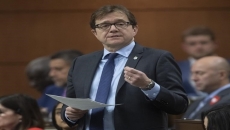Getting kids back to school is "essential," says British Columbia's top doctor as she and the education minister laid out plans for keeping students safe while COVID-19 infections surge.
Join Adrian Dix, Minister of Health; Jennifer Whiteside, Minister of Education; and Dr. Bonnie Henry, BC’s provincial health officer, for an update on COVID-19. #CovidBC https://t.co/c8wCxrkOM7
— BC Government News (@BCGovNews) January 7, 2022
Dr. Bonnie Henry said Friday that schools need to remain open for the emotional, physical and intellectual well-being of children.
"It is always a challenge when we have more illness in our communities, how that's going to affect schools, and we've been working very hard this week to make sure that we have contingency plans in place for when its staff are ill, educators are ill, and for students," she told a news conference.
Businesses will also need to redeploy their COVID-19 safety plans to help reduce crowding and protect workers and customers while keeping their operations running through the surge, Henry added.
The reopening of schools in B.C. was delayed until Jan. 10 to give public health officials a chance to assess the impact of the Omicron variant and allow educators to implement enhanced safety measures.
Henry acknowledged the anxiety of parents, especially if there are vulnerable family members at home.
However, she said students are safer in educational institutions than in some of the "unstructured settings that children are in outside of the school environment."
"And I just want to reassure you, that the things that we have in place will do our best to mitigate any of the challenges we have," she said.
Education Minister Jennifer Whiteside said safety measures include virtual assemblies, visitor restrictions, staggered break times and access to three-layered masks as they navigate this wave of COVID-19.
School attendance will be monitored, and an unusual dip will trigger a response from public health, which may include an investigation, the use of rapid tests or a temporary shift to how students learn, she said.
"To help with effective information sharing, parents are encouraged to report rapid test results to public health and to ensure they contact the school if their child is staying home because of illness," she said.
Teri Mooring, the head of the BC Teachers' Federation, said she would like to see teachers prioritized for COVID-19 vaccine boosters and N95 masks available for use in schools.
Enhanced masking, using HEPA filters and ensuring teachers have their third shots will support schools to stay open, she said.
"For the length of time students and teachers are in school, we think N95s are appropriate."
Health Minister Adrian Dix said the province will distribute rapid tests to schools next week. B.C. has about 1.1 million rapid tests, half of which are not suitable for personal use without help from a health-care worker, while the rest are spoken for, he said.
The province is expecting a total of about 11 million rapid tests from the federal government to arrive this month.
Henry said PCR testing is the most accurate, but B.C. has reached its capacity limit for testing.
When the rapid tests arrive next week, they'll be used on teachers and school staff who have symptoms, allowing them to stop outbreaks or getting people to go back to work, she said.
"They're used as a red light to help us understand if they’re positive, that somebody has COVID or that COVID is in an area or a community. They are not being used as a green light to allow people to socialize as we've seen been used in other places."
It is sometimes a challenge to adapt to things as they arise, but educators and staff are excited to welcome children back into schools, Henry said.
"We've also seen the remarkable resilience and adaptability of our school communities and I know that's what is going to help us get through which will undoubtedly be some rocky times in the next few weeks."






